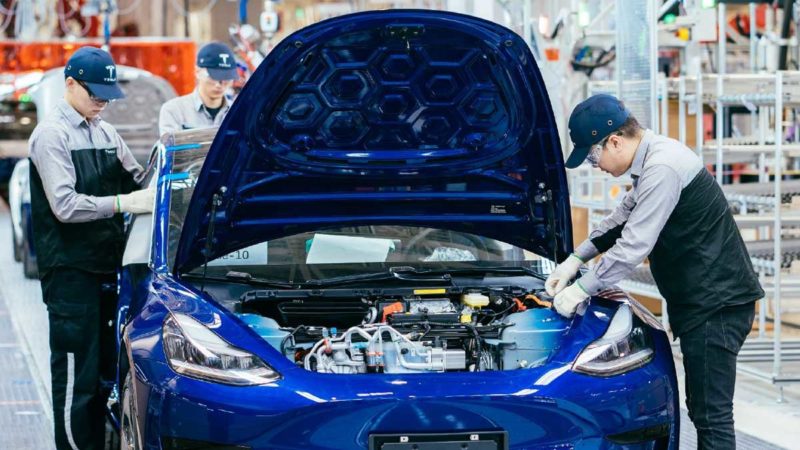Tesla has not only disrupted China’s entire new energy vehicle market, but it is also putting pressure on second-tier luxury car brands.
According to the China Association of Automobile Manufacturers (CAAM), which held a press conference in Beijing on Wednesday, retail sales in the auto market rebounded in July, and the luxury car market’s recovery speed significantly surpassed the mid-to-high-end car market.
But an interesting picture – similar to what has occurred in the US – is beginning to take shape in China, where the Tesla Model 3, now being manufactured in Shanghai as well as Fremont, is not only dominating the electric vehicle market but disrupting sales of luxury brands such as Lexus, Cadillac and Volvo.
While the Chinese EV and battery maker BYD is still the leader in the new energy vehicle market, Tesla was not far behind in July sales.
Tesla sold 11,041 new energy vehicles (NEV, the local term for zero emissions vehicles) in July, thanks to a post-Covid recovery of the Chinese auto market, with cumulative sales totalling 60,500 unitsto the end of July, according to CAAM.
Tesla led #China Jul personal #EV sales at 11,041.#BYD led #NEV sales with 14K.
EV startups made 14K, +174% YoY.
(CPCA) pic.twitter.com/DDnOdZMOMZ— Moneyball (@DKurac) August 11, 2020
Sales of 100% electric new energy vehicles continued to grow, with a 37% increase year-on-year, and although CAAM estimates the entire year will see a 10% drop in NEV sales, it estimated Tesla will sell 100,000 vehicles by year’s end.
#China 2020 #NEV sales estimate remains unchaged at 1.1M, -10% YoY.
Tesla sales estimated at 100K.
(CAAM) pic.twitter.com/8V2BytvEjv— Moneyball (@DKurac) August 11, 2020
Boosted by the opening of Tesla’s Shanghai factory in late 2019 which has enabled a steady supply of Model 3 electric sedans, the results mean Tesla is now in the top ten of second-tier luxury brands in China.
According to data from the National Passenger Association, the retail sales of luxury cars in July increased by 30% year-on-year, and the market share remained at a historical high of 15%.
In the same period, the retail volume of the passenger car market was 1.597 million, a year-on-year increase of only 7.7%.
Local analysts say that the disruption of the China auto market is being driven by young consumers and demand for high-tech vehicles powered by “new energy”.
“The upgrade of the entire auto market has actually started last year,” Zhang Xiaoliang, founder of So.Car Product Strategy Consulting, was quoted as saying by Yicai (translated from Chinese).
“One is the exchange-purchase demand of mainstream consumer groups in the post-70s market, which has driven the market demand upward; the other is the trend of intelligence and new energy, and young consumer demand for high-end products.”
Among the second-tier luxury brands in July, Lexus was still the leader in terms of both volume and price with 119,000 units sold year-to-date and an increase of 38.6% the year before.
But its growth was surpassed by Tesla which saw a doubling of sales year-on-year, in part thanks to the opening of its Shanghai factory in late 2019, which caused it to enter the top ten in the second-tier luxury segment.
By comparison, Cadillac came in at number two, achieving a solid 36% year-on-year positive growth in July, with sales reaching 20,000 vehicles in the first seven months of 2020. Volvo Cars, ranked third, sold 14,379 vehicles in July, an increase of 14% year-on-year and cumulative sales to July coming in at nearly 80,000 vehicles.
Jaguar Land Rover however sold just 37,000 vehicles in the first half of the year, down 27.8% year-on-year, and its faltering saw Tesla has emerged in the luxury car market and has entered the top ten camp.
According to Yicai, the China Association of Automobile Manufacturers predicts that Tesla will sell 100,000 vehicles in China in 2020.
In the context of the competition between the first-tier luxury car brands Audi, BMW, and Mercedes-Benz (ABB), Tesla’s sales in the first seven months have closely followed Volvo, becoming the fastest growing car company in the market segment.

Bridie Schmidt is associate editor for The Driven, sister site of Renew Economy. She has been writing about electric vehicles since 2018, and has a keen interest in the role that zero-emissions transport has to play in sustainability. She has participated in podcasts such as Download This Show with Marc Fennell and Shirtloads of Science with Karl Kruszelnicki and is co-organiser of the Northern Rivers Electric Vehicle Forum. Bridie also owns a Tesla Model Y and has it available for hire on evee.com.au.


